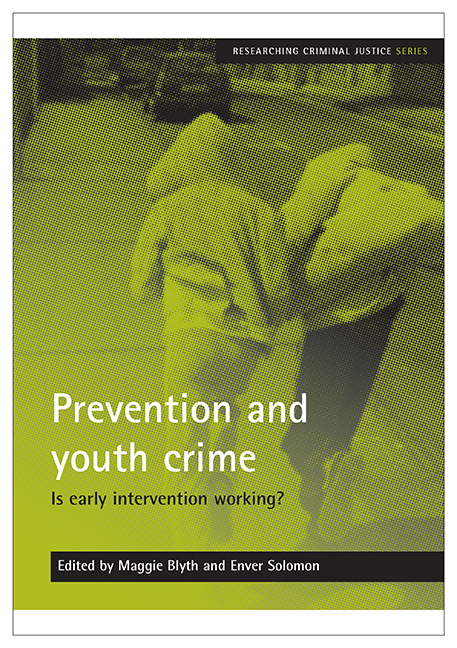Book contents
- Frontmatter
- Contents
- Foreword
- Acknowledgements
- List of abbreviations
- Notes on contributors
- Introduction
- 1 Integrated or targeted youth support services: an essay on ‘prevention’
- 2 Intervening in gang-affected neighbourhoods
- 3 Family intervention projects and the efficacy of parenting interventions
- 4 Early intervention and prevention: lessons from the Sure Start programme
- 5 Attachment research and the origins of violence: a story of damaged brains and damaged minds
- 6 Early intervention in the youth justice sphere: a knowledge-based critique
- 7 European perspectives on prevention
- Conclusion
Conclusion
Published online by Cambridge University Press: 25 March 2023
- Frontmatter
- Contents
- Foreword
- Acknowledgements
- List of abbreviations
- Notes on contributors
- Introduction
- 1 Integrated or targeted youth support services: an essay on ‘prevention’
- 2 Intervening in gang-affected neighbourhoods
- 3 Family intervention projects and the efficacy of parenting interventions
- 4 Early intervention and prevention: lessons from the Sure Start programme
- 5 Attachment research and the origins of violence: a story of damaged brains and damaged minds
- 6 Early intervention in the youth justice sphere: a knowledge-based critique
- 7 European perspectives on prevention
- Conclusion
Summary
The contributions in this volume raise important policy questions in relation to early intervention strategies and prevention work with children, young people and their families. In terms of current government policy, it is clear that early intervention has become firmly embedded under New Labour's administration as the overarching strategy to address both social exclusion and offending behaviour among children, young people and their families. While there is no blueprint or absolute definition of early intervention at the national level, there are a number of assumptions underpinning the approach that we set out in the Introduction to this volume. These are that the earlier the intervention, the better it will be, that targeted as opposed to universal provision is appropriate and that coercive engagement based on a carrot-and-stick approach is most effective. Each of these is debated in the wide range of contributions to this volume.
In conclusion, we attempt to chart a path through the contentious intervention field in the context of the reformed youth justice system and its rebalancing during 2008. We consider how the greater integration of youth justice with youth services, children's services and family work allows for a new structure at a local level in which to respond properly to the needs of those young people and families considered most at risk of offending.
During 2008, the government has set out its agenda comprehensively in two key documents. The publication of the Youth taskforce action plan in March 2008 (DCSF, 2008) and the Youth crime action plan (YCAP) in July 2008 (HM Government, 2008) reinforces early intervention strategy as fundamental to addressing youth crime and anti-social behaviour (ASB). These documents charge children's services at local level with its implementation. This provides some readjustment for youth justice services, with the investment in prevention moving back firmly into the social care arena although maintaining important criminal justice links. Opportunities for improving educational chances, promoting health intervention and providing safe accommodation for vulnerable children will be important outcomes associated with the Every Child Matters agenda to be firmly embedded in one Children's Plan for each local authority. Increasingly, these outcomes are set within Local Area Agreements to ensure that those children, young people and families most ‘at risk’ are top priorities for Local Strategic Partnerships.
- Type
- Chapter
- Information
- Prevention and Youth CrimeIs Early Intervention Working?, pp. 115 - 120Publisher: Bristol University PressPrint publication year: 2008



